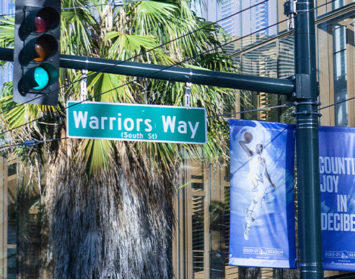For the most part, developers and other companies get along. After all, companies create the demand for developers to design, develop and build facilities that employ people. Developers, in turn, patronize other companies by purchasing goods and services. Usually, the relationship between developers and other companies is a marriage made in heaven.
However, there’s little if any wedded bliss at a bay front site on the western edge of downtown San Diego’s Little Italy where a developer team plans to erect more than 200 loft apartment units near one of San Diego’s most valuable employers.
GLJ Partners and Jonathan Segal Architect want to build the 232-unit Fat City Lofts project at Pacific Highway and W. Hawthorn Street, the site once occupied by the Fat City and China Camp restaurants. The site is zoned for commercial and residential uses and under the city’s zoning ordinance.
Change for the Worse
At first glance, residential use on that site, which is zoned for such, shouldn’t be a problem. However, there is a problem and it’s big enough to have a mammoth impact on the city’s jobs market. Just a stone’s throw away sits the 27-acre Solar Turbines plant where 1,800 union workers and others work. A new residential project could imperil the company’s operating permits issued by dozens of county and state regulatory agencies. If these permits cannot be renewed, then the company cannot continue to operate at the site it’s occupied for the past 80 years.
Trying to ensure it would be a good neighbor, the development team has offered to promise in writing not to object to Solar’s proximity to the site and ask the project’s tenants to sign statements to the same effect. Problem is, it isn’t up to the developer or tenants. The permits stipulate certain thresholds for air quality, noise, and other manufacturing byproducts.
While we, as a society, embrace private property rights, we’ve long ceded the notion that a property owner can build what he wants anywhere. There are reasonable restrictions in place to ensure that the rights of one owner aren’t at the expense of another.
So, if the two cannot co-exist, who should go? The answer depends on at least two variables: What land use has the most beneficial impact on the community as a whole? And, which of the two has more flexibility to locate elsewhere?
The answer to the first question is intuitively obvious, considering that the choice is between a couple hundred lofts and 1,800 jobs – good ones. Then there are the tax revenues that Solar Turbines generates. The company has a considerable positive impact on our city and county tax rolls. And, for what it’s worth, San Diego enjoys some status as home of a company that is owned by Caterpillar Inc., one of the world’s largest heavy equipment manufacturers.
That leads to the question, which land user has greater flexibility – a company whose heavy industry facility cannot be replicated elsewhere in a metropolitan area that is largely built out in such uses or a residential project. The answer is clear.
Making the Best of It
Jonathan Segal is an immensely respected architect whose portfolio includes many stylish residential projects. He’s a real gift to San Diego, and I’m a great fan of his work. In case it’s not too late for him and his partner to bow out of this mismatched project gracefully, there are other land uses that wouldn’t jeopardize Solar’s operation and would provide needed facilities for the surrounding neighborhood. An office building, parking structure, small park or retail space would enjoy patronage from Little Italy’s residents.
The decision whether to allow Fat City Lofts ultimately rests with the city’s Centre City Development Corp. — whose jurisdiction, by the way, includes other downtown San Diego locales where 232 loft units would be welcomed by the neighbors. Segal’s flair for urban design excellence can be modeled elsewhere without threatening the ability of a major employer to continue to operate.
Solar Turbines has worked for the community. It is the community’s job to protect this valuable business resource.
Jason Hughes is founder of Hughes Marino, an award-winning commercial real estate company with offices across the nation. A pioneer in the field of tenant representation, Jason has exclusively represented tenants and buyers for more than 30 years. Contact Jason at 1-844-662-6635 or jason@hughesmarino.com to learn more.









